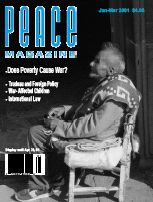
Peace Magazine Jan-Mar 2001, page 28. Some rights reserved.
Search for other articles by Peter Nicholls here
The Faslane submarines and their missiles are Britain's last carriers of nuclear devices. The U. K. Parliament and Government retain control over Scottish defence policy and the bases in Scotland. Angie Zelter, Ellen Moxley and Ulla Roder, boarded a Trident barge in June 1999 and threw some computer equipment overboard. They then called the police and were charged. Sheriff Gimblett ordered their acquittal on the grounds that they had acted on a view that was reasonable.
The defendants - an Englishwoman, a Scotswoman and a Danish woman - will not be tried again on these charges. But questions remain about the conditions under which a judicial direction of acquittal may be made in Scottish law. The World Court judgment in 1996 asserted that use or threat of use of nuclear weapons is contrary to international law. Similar conclusions can be drawn from readings of the U.N. charter, the Geneva Conventions on War, and the principles advocated at Nuremberg.
The U. K. Government has asked for The Lord Advocate's Reference, a peculiarity of Scots Law. What is the Law of Scotland? The High Court of Justiciary is supposed to tell us, while not undermining the present acquittal, in order to direct sheriffs in the future. The questions put to it are (in summary):
Angie Zelter's answers are, in outline:
The President of the High Court is Lord Prosser. Assisted by two supporting judges, he seems genuinely interested in the questions. I attended the sessions on October 12th. and 13th. The courtroom was relaxed. No security checks were carried out. Ulla Roder had a translator into Danish, a feisty young woman who frequently asked counsel to speak up and at least once asked Judge Prosser to repeat himself. The atmosphere was scholarly.
On the first day counsel for the respondents were asked to consider whether there is a customary law with respect to nuclear weapons. Is simple preparedness a threat? What counts as a threat? After a while came an interruption. Through the unguarded door came a man demanding to sign a petition. Lying next to me was the Abolition 2000 petition and I passed it to him. Signing he said: "I'll keep quiet now." But not for long. After a few minutes he got up to say: "If God wanted nuclear bombs he would have made his own." Both Counsel and the bench indicated only amusement.
Counsel was concerned to show that their action was not to be defended by arguments of freedom of expression or civil liberty. There might be a defence of necessity. One may sometimes justifiably commit a crime to prevent another illegal act. But does this apply to international law? Nuremberg establishes some duties. If it was good enough to prosecute, it may be good enough for a defence.
The defence of necessity might succeed. Or the defence might fail but the state of mind of the actor still justify the act. I may perhaps exceed the speed limit to catch a thief. Or I may do so because I genuinely believe I am catching a thief, even though no thief exists. Or because I genuinely believe that I am preventing an illegal act even though that act is not in fact illegal.
Can self defence apply to defending others? To others known to the actor? To the whole world? If so, who are the permitted actors? Anyone? Is there a criterion of acting "reasonably" and "proportionately"? Must there be an imminent danger to the public?
Is the defence of necessity the only defence to proven criminal mischief? If so, how circumscribed is it? Must there be no legal alternative? Is a defence of necessity viable if there were alternate routes open to the actor? If so, how can the absence of reasonable legal alternatives be shown? Is "immediate danger" inclusive of constant danger? Must the victim(s) be positively identified? Must the threatened individual have some kind of proximity to the actor? Or just be the whole world? Must the act have a reasonable possibility of success?
Deployment is arguably preparation for war. Is Trident at sea automatically "at war"? Counsel suggested "yes" although the bench seemed doubtful. I think that any submerged submarine other than those under a "vessel below" flag should automatically be considered "at war" and acting at its peril (the Swedes did drop a depth charge near a Soviet sub in their waters on one occasion). At least surface vessels can show their intentions.
My suggested answers to the Crown's four questions are:
Question 1. In a Scottish criminal trial, can evidence be brought concerning "customary" international law as applied to the U. K.? Yes, certainly.
Question 2. Does any rule of customary international law justify a citizen in damaging anything in pursuit of objections to U.K. possession of nuclear weapons, their presence in Scotland, or nuclear weapons policies? Probably not, or at least not now.
Question 3. Does a belief that actions are justified constitute a defence to malicious mischief ? Sometimes it does.
Question 4. Is it a general defence that the offence was committed to prevent an offence by another? Sometimes it may be.
As judge I would wrap that up in linguistic ways that would leave all sides a little pleased and a little annoyed.

Peace Magazine Jan-Mar 2001, page 28. Some rights reserved.
Search for other articles by Peter Nicholls here